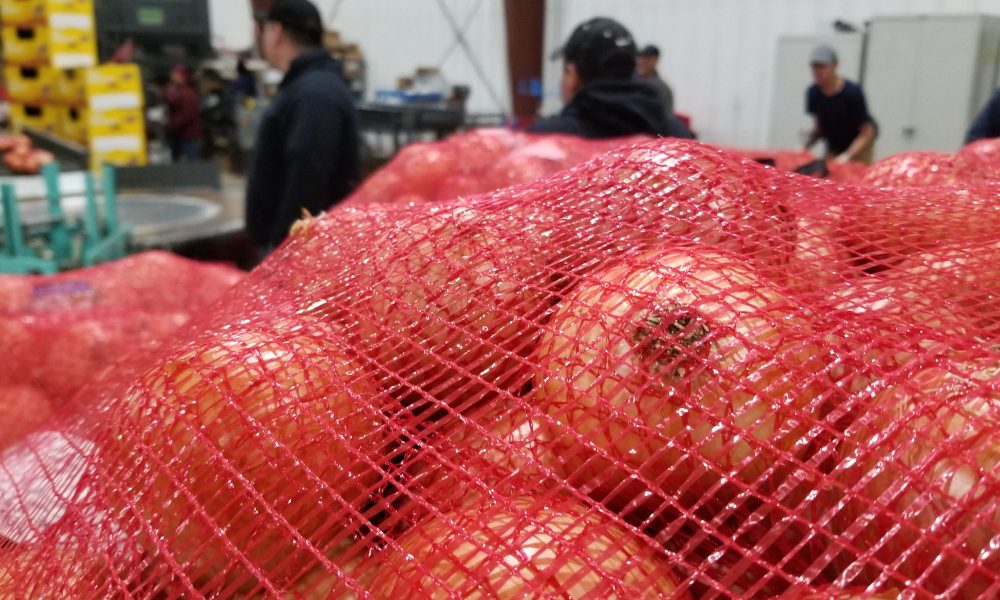
Questions are mounting about the proposed rail shipping center in Nyssa, and the community deserves straight answers. Millions of dollars of public money and potentially dozens of jobs are at stake. Economic development officials need to be more forthright.
The Treasure Valley Reload Center is projected as an economic boon for Malheur County. The center would handle produce, primarily onions, for fast shipment to key markets around the U.S. Early projections were that the center could save local onion shippers about $2 million in costs. The center also could produce new full-time jobs, though the number seems uncertain, and could trigger other industrial development in Nyssa.
But consultants recently raised cautions about the project. The Tioga Group, hired by the state Transportation Department, questions the rail service to the Nyssa plant. It notes that Union Pacific Railroad already operates a produce shipping plant in Washington state and that Nyssa would be a competitor. The report judged that rail service from Nyssa would be worse than what’s available in Wallula. And the consultants note that Union Pacific’s commitment to Nyssa so far seems to be a promise to negotiate – not a promise to provide service. The railroad hasn’t disputed the consultants.
The findings troubled a special state review committee, which concluded the Nyssa project needs a more firm commitment from the railroad. Greg Smith, Malheur County’s economic development manager who heads the rail project, has been less than clear about these railroad questions. He told the Enterprise two weeks ago that the consultants didn’t ask about Union Pacific. But they did. RailPros, a company working with Smith, provided a two-page letter addressing some rail issues, even before the consultants submitted their questioning report.
RailPros itself has direct ties to Union Pacific, explaining in its letter to the state, “RailPro has contracts in places with UPRR to prepare development concepts for various potential projects.” The company official who wrote the letter didn’t respond Monday to whether RailPros would be hired by the railroad for the Nyssa project.
Smith noted that the Union Pacific railroad executive who wrote a crucial letter of support for Nyssa is no longer with the railroad. Now, that former executive is waiting to sign on as a paid consultant to the Nyssa project, according to Smith. Smith offered to provide contact information to reach the executive to explain the rail business, but never did. Hiring such expertise might make sense, but any appearance of back scratching has to be avoided.
The consultants also flagged a significant discrepancy in the Nyssa plan. The state was told in one place that land for the rail center would cost $1.6 million. In another place, the land cost was reported at $2.8 million. Questioned about difference, Smith initially said “I’d have to go look” for the explanation. Later, he wrote “there is a very logical reason” but didn’t provide it. This is no small accounting matter. The land being considered for the rail center is owned by the family of Jim Farmer, president of Fort Boise Produce. Farmer also sits on the board of the Malheur Economic Development Corp. – the public board overseeing the rail project. What’s more, there is a separate deal of about $200,000 for water rights from the Farmers as part of the project.
Farmer isn’t voting on these real estate deals, but the public deserves a full explanation for what’s happening here. There can be, should be, no hint of insider dealing and certainly there is no justification for keeping from the community an explanation for this million-dollar gap.
Amidst all the questions, there was one encouraging recommendation. The consultants and the state’s review committee both saw a bigger opportunity for Nyssa than just as an onion shipping plant. Such a broader view would make the Treasure Valley Reload Center a truly regional resource. This recommendation ought to be pursued with vigor, if only to strengthen the Nyssa operation.
We have supported this project from the start for the economic trigger it could be for our region. We have also urged this work be done transparently. The public needs to have faith that its interests – and money – are being well safeguarded in priority over private business interests. If the rail center becomes too mired in doubt, the project could be at risk. Those in charge have it in their power to avoid such a fate and they can do so by being more open about the challenges and risks. – LZ




